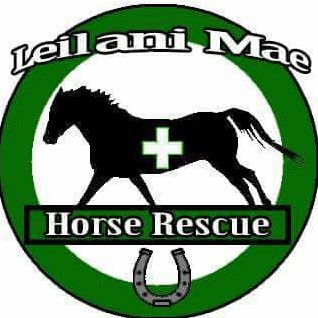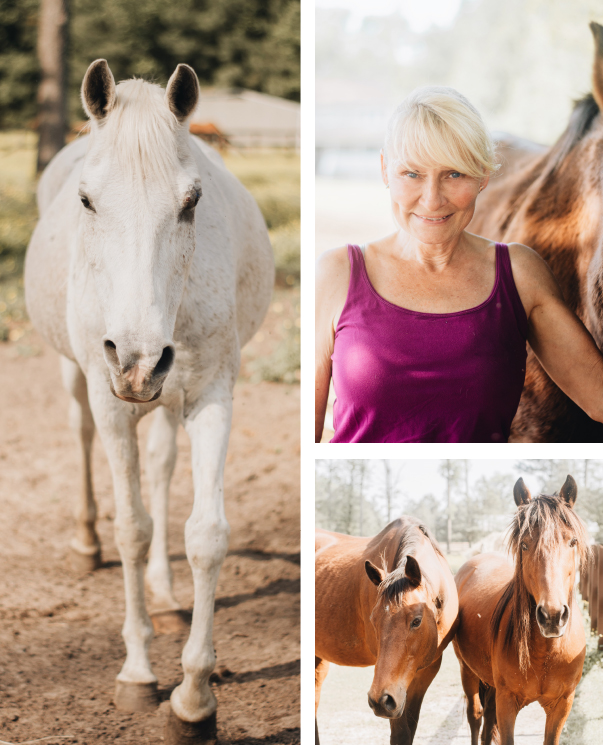 With pony-tail bobbing to and fro, the blue-jean clad horsewoman delivers hay and feed from the barn to trough with the consistency of a pendulum. It takes a long while to get all 28 wards good and fed. From behind, her blonde hair and petite figure are a reflection of the young horse-crazy girl she was back in her native Ohio. Turning around, however, her furrowed brow, wise-to-the-world eyes, and calloused hands betray the youthful countenance. For Debbie Gillis, owner of Leilani Mae Horse Rescue in Linden, a small community in northern Cumberland County, the worry and work never seems to end. But yet, she wouldn’t trade any of it for the world.
With pony-tail bobbing to and fro, the blue-jean clad horsewoman delivers hay and feed from the barn to trough with the consistency of a pendulum. It takes a long while to get all 28 wards good and fed. From behind, her blonde hair and petite figure are a reflection of the young horse-crazy girl she was back in her native Ohio. Turning around, however, her furrowed brow, wise-to-the-world eyes, and calloused hands betray the youthful countenance. For Debbie Gillis, owner of Leilani Mae Horse Rescue in Linden, a small community in northern Cumberland County, the worry and work never seems to end. But yet, she wouldn’t trade any of it for the world.
“Let’s just put it this way,” she explained matter-of-factly. “If I had not started all of this, I would not be here right now.”
Referring to the PTSD symptoms that follow her like a moth to light, Gillis says it took her years to admit she has the condition that she has seen in so many of the soldiers that come to her farm near Ft. Bragg seeking solace and peace and some four-legged therapy. Like so many, she finds help by taking her mind and attention away from her own troubles. As she helps others, in this case, horses, Gillis can better face her own struggles. Gillis started Leilani Mae Horse Rescue in 2009 in response to the inhumane treatment of horses she found prevalent in the US. Being the horse lover she is, she could not turn a blind eye to the issue. The retired Army First Sergeant sat down at her country home with OutreachNC’s Crissy Neville recently to discuss her labor of love to help horses, others, and herself.

Crissy Neville: You have a lovely farm here, with an even prettier name. Who was Leilani Mae?
Debbie Gillis: She was my mother, named after the song Sweet Leilani that was popular in the 40s. She was a horse advocate, an animal advocate really. When she was a child in Minnesota she rode a Percheron to school every day in the fall and spring. Not in the winter, of course. This was in the late 1940s to early 1950s. She told me she would let Old Joe go and he would just wait for her outside the school. I said, oh yeah, right Mom, but then I realized those rural schools had nothing but grass around them so I am sure he did hang around.
CN: Was it your mother who instilled in you a love for horses and riding?
DG: Indirectly, yes, but I was raised by my grandparents. I started riding and working with horses at age 11. I lived in the city but my grandparents’ friends had horses. I rode my bike 5 miles out to their house all the time. I was out there about every night, and I knew someday I would have a horse of my own.

CN: And now all these years later, after a distinguished Army career, here you are in the country with lots of horses. Ones you rescue. Did you buy this farm for that purpose?
DG: No, it was an accident. Originally, after 24 years in the Army and over 100 missions, I was ready to settle into a quiet country life. I had been able to keep riding throughout my career and was ready to finally get my own horse. And, I had always wanted a wild Mustang. Right after moving here, I went to the online adoption site for the Bureau of Land Management and bought Red Cloud. I still have him; he’s 10 now. Through his adoption, I learned the plight of horses here in America. I learned what is really happening to horses. And I was shocked.
CN: Shocked? What did you discover?
DG: What I found out was that nearly 150,000 American horses went to slaughter back in 2014-15. Last year it was closer to 80,000. Of the ones that go to slaughter, 93% of the horses are under the age of 10, healthy, and should have never been there, but it is a big money racket. I think every horse is deserving of life or a humane death. We are not even talking about a humane death; it is horrific.
CN: Why are horses being slaughtered? Is that legal here in the States?
DG: They are slaughtered for their meat to satisfy overseas diners in countries such as Germany, Italy, France, Belgium and Japan. They actually use all their parts; the kill-buyers even cut off their tails as they are going into the pen to be slaughtered. The kill-buyers will go to auctions and bid up to meat price on the horses, even a little above now. The only reason for the decline is that the Europeans have learned that American horses are carcinogenic; we give them wormers, Phenylbutazone, (Bute), and different things that cause cancer if consumed by humans. So now they are trying to come up with new laws in Canada and Mexico that the horses have to be tested but it is only random. If it was not such a moneymaker for the kill buyers and such a big industry it would not be happening.
CN: This cannot be legal for these buyers to purchase these horses for slaughter. This happens here in the US?
DG: It is illegal here in the U.S. for horses to be killed for human consumption so the horses that are in the kill pens get transported to Canada and Mexico where it is legal. And the horses are kept in appalling conditions until time for them to ship. No one in this state has a contract license to Canada or Mexico, so the kill-buyers here are middlemen. They fill a trailer full of about 32 horses and take them to Pennsylvania or Virginia to one of the men that do have the contract license, and this happens about every two weeks. Many horses don’t survive this road trip. It is awful. The horses are trucked for more than 24 hours at a time without food or water. A lot are trampled to death.

CN: What is the answer to this issue? You work so hard to save the ones you can, but you cannot save them all.
DG: The answer is to stop horse slaughter; to stop the transportation of our horses to other countries and to require responsible horse ownership. Horses are treated by many like disposable objects and are considered livestock in our state, but they are raised by the human hand. Cows and pigs are not our pets, are not petted or ridden. Horses are coddled and loved. They are domestic and they think differently. There is a reason why they are used as therapy animals. One hope we have right now is The Safeguard American Food Exports (SAFE) Act. It is federal legislation that would prevent the horse slaughter industry from reestablishing in the U.S. and prohibit the export of American horses abroad for slaughter. Of course, anti-horse-slaughter bills have been introduced in each Congress for the past decade, but not one has passed into law. We’ll see what happens this time.
CN: Do you rescue horses in any other way? What horses do you have right now for adoption?
DG: I get calls locally about horses that need homes. Some come from animal control and from auctions but most are headed to kill pens. Some of the ones we have are sick and never get better and will die here but others are very much adaptable. I have 25 rescues now and three of my own. We have Arabians, Thoroughbreds, Paints, Haflinger, Morgan cross, Appendix, Quarter Horses, and Mustangs, all from ages 2 to 36. We work on medical issues, grooming, and training to get all the ones that can be adopted able to go to a new home, but about half of the ones here are permanent residents. Take Lindsey, the Quarter Horse mare (pointing), for example. She has navicular, severe arthritis in the pastern bones. And then there’s Divinci, the Quarter Horse paint (pointing). He has what you might say is PTSD from past abuse. I cannot in good conscience let horses like these go.
CN: Do you have any help? With so many horses to care for and ones with special needs at that, you must stay very busy.
DG: We have a wonderful neighbor who is a veterinarian, Dr. Brian Garrett. He helps us with the horses’ medical needs, and if it was not for him, we could not keep going. We also get schoolkids and soldiers from Ft. Bragg on the weekends but we could really use more volunteers during the week. They help with feeding, grooming, barn work, grounds keeping, fundraisers, social media, and things like that. Anyone who would like to help can find out more on our website www.leilanimaehorserescue.com.
CN: You mentioned before the horses are part of your own personal therapy, but Leilani Mae is not a therapy center. Is this a natural byproduct of working with horses?
DG: Oh yes, they are my therapy, and yes, horses are soothing. To me, doing all this is plenty worth all the work; I am lucky. As for the soldiers who come regularly, being with the horses seems to be helping them too. Sometimes they do not want to talk about their feelings and problems but they just want to come out here and help and hang out. I understand. They just do what they need to do, and I do, too.
